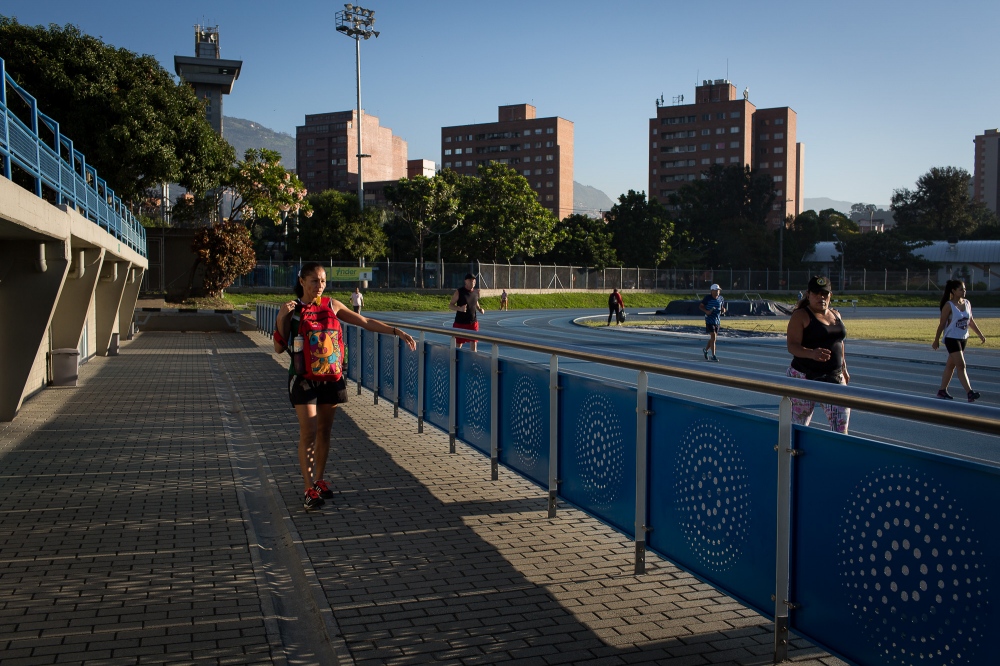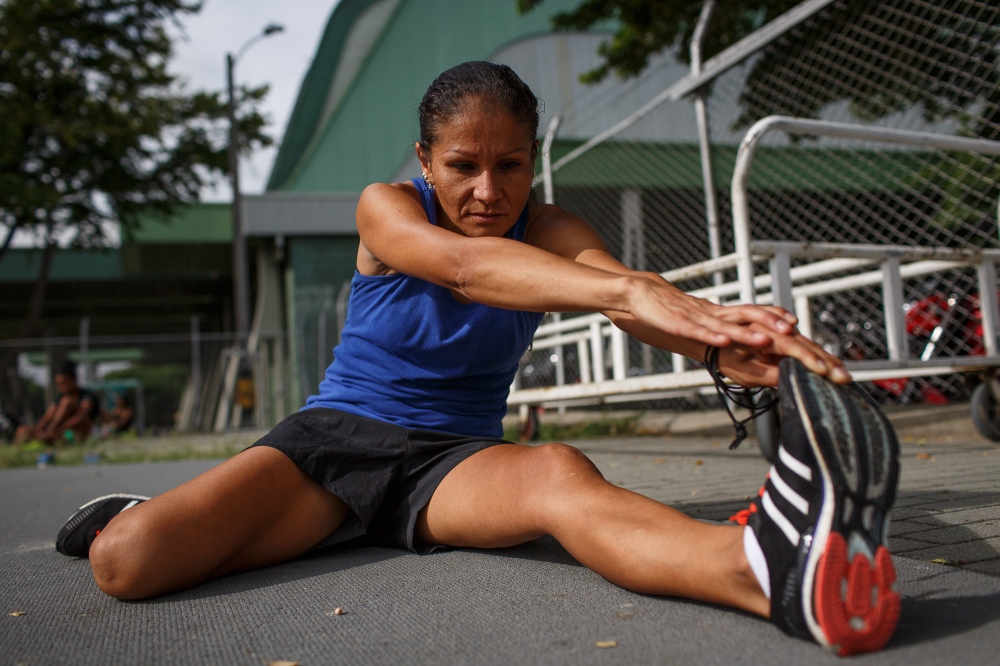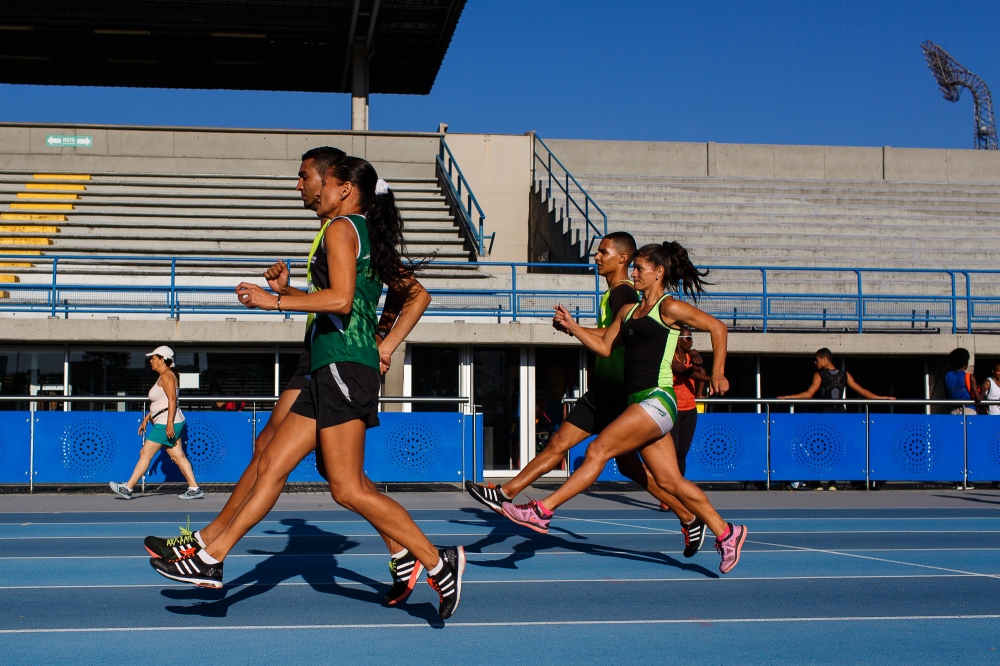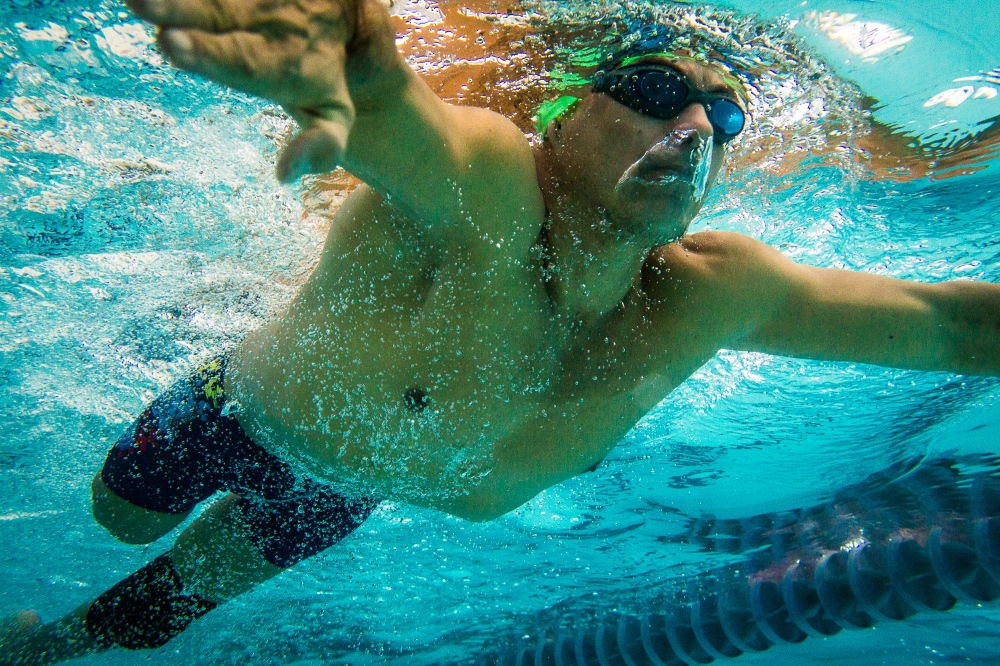Maritza Arango, 38 - Track Running18 years ago Maritza discovered that she suffered from Retinitis Pigmentosa, a disease of the eye that leads to loss of vision and eventually to blindness.
Maritza used to live in Argelia, a village of Antioquia Department, where her family had a farm and the little town's only shop. Her family were forced to sell products to everyone, including all the different armed forces that operated in the area. Rumours started circulating that her family would be a target by the guerrillas. Her family decided to leave the village and move to MedelliÌn. They left with only the clothes they wore. Days after they left, there was a massacre perpetrated by the guerrilla next to her house. With time Maritza lost completely her sight, and on top of that being displaced, she started struggling to make money to support her child.
But her life changed again when in 2008, Maritza was invited by a friend to try athletics, as a way to make an income. Trials on track running went well. In two years she started to go to international competitions, and in 2011 she won a silver medal on 800 meters at the World Championships in New Zealand. As a result, she repeated again in the 2013 World Championships in France. In 2015 she won silver on 1,500 meters.
This year in Rio de Janeiro she expects to win a medal. But for Maritza, the most amazing thing is that she never thought she would be a sportswoman. She confesses that before she didn't even know what the athletics or Olympic games were. "Leaving my town was like a blessing. When I lived there I thought that would be my life. I never imagine this or even getting on a plane. Never, ever".
-
Maritza won the Bronze Medal on the 1,500 meters during the 2016 Paralympic Games in Rio de Janeiro.
Fábio Torres, 39 - PowerliftingFaÌbio is a retired Army Corporal. In 2008, he stepped on a landmine while on patrol in the Colombian jungle, losing his left leg. The accident became a significant change in Fabio's life; he felt he had to learn everything again. FaÌbio found the strength to continue his life through sport, and mainly powerlifting, which he at first just practised as a hobby.
Since 2009 he dedicates all his time to the sport, in the beginning just as a rehabilitation process and now as a full-time sportsman. He has had a successful year, in 2016; FaÌbio became World Champion of Powerlifting in Brazil after lifting 211kg.
In the Rio 2016 Paralympics, he wants to bring a medal home. Regarding the violence in his country, he hopes that the peace process goes further. There are already too many victims, and he doesn't want people to go through what he has been through. He believes that the country needs less violence and more sports so that they can get peace in Colombia.
Moises Fuentes, 41 - SwimmingMoises used to be a farmer and sell cattle with his brother when in October 1992, Paramilitaries in the region of Santa Marta targeted them. Moises was shot six times, and his brother was killed. He was lucky to survive, one of the bullets crossed his neck, and one stuck in his spine and he couldn't walk again. However it did not end there, a few months later, during a rehabilitation session, he broke his leg and due to an infection, he had to amputate it.
Moises felt it wasn't worth living anymore. But after meeting a group of other victims that had even more severe injuries, he grabbed life with will and began to feel motivated. He started playing wheelchair basketball and studying. In the process of the rehabilitation, he was spotted as a good swimmer, even if he didn't possess any technique. After some success in the swimming pool, he became completely dedicated to the sport, while finishing degrees as a tailor, public accountant and hopes to graduate as a sports teacher next year.
Among many achievements, he won the Bronze medal in the 2008 Paralympic Games in Beijing and the Silver medal in the 2012 Paralympic Games in London in the 100 meters breaststroke category. He also became the World Champion at the 2013 World Swimming Championships. Moises hopes that in the Rio 2016 Paralympics, he will bring the gold home.
He believes that people must value their life, what they have and help people on the way. "Everyone is a champion, but some people don't do the necessary to really became one" he says.
-
Moises won the Bronze Medal in 100 meters breaststroke SB4 during the 2016 Paralympic Games in Rio de Janeiro.
Edwin Matiz, 23 - CyclingEdwin has been practising Paralympic Cycling since he was 16 years old. At the age of 12, he lost his left hand while playing with an anti-personnel mine that was left on the side road by the guerrillas.
The process of recuperation was long and arduous because his parents lacked financial resources. Through the help of some charities and foundations, he was able to rehabilitate, mostly through the practice of cycling.
After he finished high school, he started to focus 100 per cent of his time on the sport, and he has managed to qualify for the Rio 2016 Paralympic Games.
He dreams of a medal, but he says that just to represent his country is already a good prize for now.
-Edwin won the Bronze Medal on the cycling men's individual pursuit C5 during the 2016 Paralympic Games in Rio de Janeiro.
Jonathan Fontes, 35 - Seated VolleyballJonathan is a retired soldier of the Colombian army. In 2012, he stepped on an anti-personnel mine during a routine round in the Caqueta department, losing his right leg. In the beginning, the process of recuperation was difficult since he felt he was entirely dependent on others.
At first, he started to focus on weightlifting sports but found he was too tall. He was recommended to try seated volleyball, a game that until then was unknown to him. Nowadays, he is the Captain of the Colombian team. The dream was to arrive at the Rio 2016 Paralympic games, but the national team only started to play the sport for the first time in 2011.
The Colombian Volleyball team finished 4th in the Pan-American Games of Toronto in 2015. Unfortunately, they needed to have finished 2nd in order to qualify for a spot on this year Paralympics. Jonathan believes it still isn't the right time and that they have much more to learn. Instead, they aim to work hard and be on the next Paralympics in Tokyo 2020.
German Gomez, 49, ArrowingGerman used to look for gold with his father in the region of Choco. But the National Liberation Army (ELN) started to threaten them and wanted German's family to pay the ELN for protection. Because German's family refused to pay, they had to leave their village and everything behind. They became displaced. Despite this, the guerrilla did not stop chasing them, and when they found them, German and his father were both shot. His father died. German suffered an injury in his last vertebra, becoming paraplegic.
With the help of a Foundation that supports victims through sports, German started his rehabilitation program. First, he began with swimming, he had never swum before and only after six months he won a silver medal at a competition. But months later he had a cramp while practising, and almost drown. The incident made him so afraid that he never returned to a swimming pool again.
As German was good at shooting in the army, he decided to try a sport that requires this skill. He started to focus on arrowing, and after a few months, he qualified for the 2015 Pan-American Games where he finished in 5th place. German managed to be eligible for the Rio 2016 Paralympic, and his goal is not only to get a good result, but he also needs to get a sponsorship that will allow him to live off his sport.
Currently, he fixes broken computers and smartphones between practices and competitions to pay his bills.
Joe Gonzalez, 38 - Weight ThrowingJoe was a teenager when a paramilitary group approached him and his friends to become part of the Bloque Cacique Nutibara gang by starting to steal and kill. Joe and his friends refused because they didn't like violence and were more interested in parties and living a life like any other typical teenager. But that refuse came with a high price. Joe and his best friend were chased on a motorbike, and the gang shot them. Joe was hit twice, one bullet hit his neck, and another bullet hit his abdomen leaving the lower back, making him paraplegic. His friend died.
At the time of the incident, Joe was trying to become a football player, so sports were always part of his life. When he understood that he would be in a wheelchair, he took on sports to keep going with his life. He started to play basketball, then tennis, and in both, he was National Champion. It was through his wife, who also is a Paralympics athlete, that he became interested in weigh-lifting, throwing and javelin. On Joe's second tournament he became a national champion, a title that he still holds today. During his progression in the sport, he reached 4th in the world. Joe qualified for the Rio 2016 Paralympic games, but due to quota places he might not be able to go, something that he feels is entirely unfair after so much work.
Asked about his feeling for the responsible people that shot him, he says, "We must be peaceful, forgive, but never forget. I will never forget because every day I have to sit on this chair".
Oscar Rios, 42 - Wheelchair BasketballAfter his military service, Oscar started to work as a bodyguard for a public prosecutor, a time of great violence in Medellin, during the 1990s when Pablo Escobar ran the city.
On an assassination attempt of the public prosecutor, Oscar was shot seven times by Escobar's assassins. As a result, he lost the mobility of his legs and feet, becoming paraplegic.
The adaptation to a new life was hard, but he decided that he had to separate the injury under his waist from his head and keep doing what he wanted. Oscar had always liked basketball, so he decided to dedicate himself to it. In 1998 he became part of Team Colombia on wheelchair basketball. During his successful career, he was several times South American Champion, was with Colombia on the top ten teams at the 2014 World Championship in Korea and went to the 2012 Paralympic Games in London. Unfortunately, this year Colombia missed the qualification for the Rio 2016 Paralympic, which was Oscar last opportunity to be back at an Olympics.
He plans to retire soon and became a full-time basketball coach. Oscar believes that there is much talent in Colombia that needs to be fostered. When asked about the accident and his life in the wheelchair, Oscar says, "Before I was an arrogant person and didn't have any love to give to my family. The accident was a blessing that made me a better, happier man and to appreciate more my life and family. If I was going to be born tomorrow, I wanted to be born in a wheelchair".
































